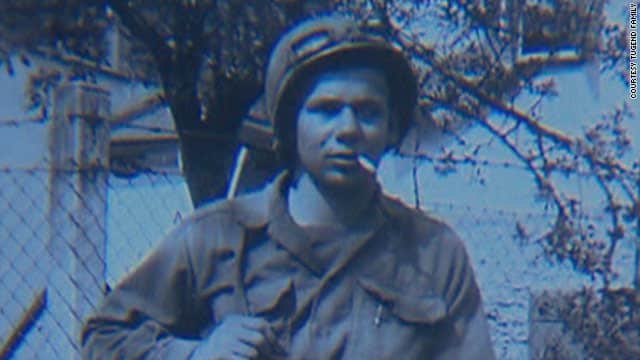 Tom Tugend at Fort Sam Houston in San Antonio, Texas, 1945 (Photo courtesy of the Tugend family)
Tom Tugend at Fort Sam Houston in San Antonio, Texas, 1945 (Photo courtesy of the Tugend family) Editor’s note: this obituary has been expanded from a previous version announcing his passing.
Tom Tugend, a dogged and prolific journalist who fought in three wars, then focused on writing the news of the Jewish world until his last days, died Wednesday, Dec. 7, 2022, at his home in Sherman Oaks, CA. He was 97.
It is not an overstatement to say that throughout his life Tugend witnessed many of the key moments in modern Jewish history.
Born Thomas Joseph Tugendreich in Berlin on June 30, 1925, his early years in an affluent Jewish family at the dawn of the Third Reich were marked by being sent off to a Jewish-only boarding school – housed in Albert Einstein’s summer house — which he loved, and then escaping with his family to the U.S. Tugend’s life was shaped by the Holocaust, though he left his home in Germany before the worst horrors of the Shoah occurred.
In 1939, as Hitler celebrated his 50th birthday with a military parade through the streets of Berlin, Tom, who was just approaching his bar mitzvah, stood on the balcony of his family’s apartment and watched the festivities with awe and little understanding of the significance of the moment. Days later, he, his mother and older sister, shipped off to America, where Tom’s father, a renown German-Jewish pediatrician named Gustav Tugendreich, had already found work.
The transition to American life was not easy for the family, especially for Dr. Tugendreich, and once Tom turned 18, he left home by registering for the draft. He was quickly called to serve in the United States Army, though still technically classified as an “enemy alien.” He was sworn in as a U.S. citizen while in basic training, shortening the family name to Tugend, and soon after setting out for Europe to fight the Nazis. Tugend served in the United States Army in the recently formed 63rd Infantry Division, which was shipped to Marseilles. His 254th regiment fought SS units alongside the French, spending months freezing in foxholes in the Vosges Mountains. For his service, he received a Combat Infantryman Badge, Bronze Star Medal, and Presidential Unit Citation.

Near the end of the war, as Tugend told the story, his fluency in German led him to be assigned to an army counterintelligence unit, for which he set out to find Nazis remaining in the German countryside. As he wrote: “Of course, every German I interrogated said that everyone, including his brother, had been an ardent Hitler follower—everyone except himself, of course. Invariably, the informant had been a stout anti-Nazi.”
With his characteristic humor, Tugend recalled decades later: “One day, I went to a village, and everybody identified an 80-year-old blind poet as the village’s premier Nazi. When I confronted the man, he readily agreed and pledged his continued fidelity to the Führer. I didn’t arrest him but returned to my headquarters, demanding recognition for having found the only Nazi in all of Germany.”
After World War II ended, Tugend returned to the U.S., only to enlist again, this time to serve as a squad leader in an Anglo-Saxon anti-tank unit during Israel’s War of Independence. Always in the thick of it, Tugend’s unit was among those encircling an Egyptian regiment in the Negev’s Fallujah Pocket led by Col. Gamal Abdel Nasser, who would later become president of Egypt.
After the war, Tugend returned to the U.S. to earn a journalism degree from UC Berkeley, where he also wrote for a student humor magazine, “The California Pelican.” Soon after graduating, he was drafted again, this time to serve in the Korean War, however his degree helped him evade combat; he spent his stint in San Francisco editing a newsletter for the Army Medical Center.

Though Tugend did not always bring it up, his three-part military experience would shape his life as much as his Holocaust experience. As the esteemed Holocaust scholar Michael Berenbaum put it, “Tom Tugend fought with valor as an American soldier in World War II, gaining valuable, dangerous combat experience. Then, rather than staying home, getting on with his life and basking in the glory of victory, he interrupted his life to battle for the Jewish State as part of MAHAL – the volunteers from outside the Land of Israel — bringing vital experience to its nascent army and giving voice to his Zionist values.”
Tugend, Berenbaum said, “had earned his stripes as an American and earned them again as a Zionist. In both he was living as a proud Jew. For him, the values were joined; the America he fought for was the land of liberty, democratic, pluralistic, tolerant, a haven for Jews. And the Israel he fought for was to be a land of liberty, democratic, pluralistic, tolerant, a haven for Jews, protective and respectful of the rights of its Arab and Jewish citizens. He lived those values to the end of his long life.”
Tugend’s journalism skills, as well as his perpetual curiosity about the world and his gift with words, would keep him writing for more than seven decades. After his military service, he worked for a time at the San Francisco Chronicle, the Associated Press in Spain, and on the night desk at the Los Angeles Times.
Writing was his calling, but Tugend claimed he had no high aspirations as an author, and after marrying the Jerusalem-born Rachel (neé Spritzer), who would become his wife of 66 years and who survives him, he set out to make a living to support their family of three daughters.
He first wrote pilot manuals at Boeing, then spent 30 years as a science writer at UCLA. At one point, the family moved to Israel so that Tugend could work at the Weizmann Institute of Science as head of its public relations department, but after a year they returned to Los Angeles. Throughout his university career, he continued freelancing for multiple Jewish publications.
After retiring from his post at UCLA in 1989, at 64, Tugend began what would be a full career in Jewish journalism, writing for the Jerusalem Post, JTA, Hadassah Magazine, and most of all as a regular contributor to the Jewish Journal, starting in 1993. He also wrote on occasion for the Los Angeles Times about entertainment. Tugend would later be named a Contributing Editor at the Journal, writing hundreds of pieces over nearly 30 years, many times multiple articles in a single issue. His last piece for the Journal was published in November.
Rob Eshman, formerly the longtime editor of the JJ, worked for decades with Tugend: “My biggest worry was that I could never be Tom Tugend’s boss. Tom had reported on wars. He’d fought wars! And he filed more copy in 10 years than I would in a lifetime— how dare I tell Tom Tugend what to do?” Eshman wrote in an email to the Journal.
“And I never did. Tom was my journalistic role model. His first answer to every assignment was yes. He showed up, wrote what he saw, kept his opinions to himself, and turned in clean copy. Only after years of working with him did I discover Tom had strong opinions and an unrelenting sense of humor. He had seen, and experienced, so much hardship and tragedy, and his answer was to write it down, to bear witness, to record the stories of our lives in tight, descriptive paragraphs.”
In Los Angeles and throughout the Jewish diaspora, a call from Tugend meant that a good story would follow; his subjects ranged from news to arts coverage. Among Tugend’s most famous subjects – and most beloved – was the filmmaker Steven Spielberg, whom he interviewed on multiple occasions. While Spielberg was always cautious around journalists, the director also recognized Tugend as a critical record keeper of Jewish history, and a valuable chronicler of the creation of the Shoah Foundation, now the USC Shoah Foundation. In Tugend’s home office are two treasured mementos, the first a photo inscribed by Spielberg that says: “To Tom, You have such an important voice. Many, many thanks, Stephen Spielberg.”
On Tugend’s office wall hangs a typed letter from the director congratulating Tugend on the honor of becoming a Knight in the National Order of the Legion of Honor in 2016. “For decades,” Spielberg wrote, “you have committed your life to ethical reporting and responsible journalism. For that, I sincerely thank you – and for your distinguished service in World War II, the 1948 War of Independence for Israel, and the Korean War; we all thank you.” The letter is signed, “With great admiration, Steven.”
Tugend loved to write about movies with Jewish content and would consistently marvel at how many Holocaust-themed films would appear each year; he loved to chronicle the best of them, especially during Oscar season.
Though Tugend often seemed ageless to those who knew him, as he entered his late 80s and into his 90s, he was urged by many to write about himself, which he did on a few occasions, albeit, at least at first, only reluctantly. For a Father’s Day issue of the Journal in 2006, he wrote about his esteemed pediatrician father’s challenges as a German immigrant to the U.S. He also wrote lovingly about his wife at the time of their 50th wedding anniversary, in October of that same year. Along with jokingly describing how their taste in breakfasts differed (he liked pancakes, she made breakfast Israeli salads with cucumbers, olives and tomatoes), Tugend wrote heart-wrenchingly of battling depression, and how his life was saved by his wife and daughters.
In person, he was a beer-drinking raconteur and loved to laugh. This despite his deep sensitivity to the hardships in others’ lives. In 2019, Tugend, along with his daughter Alina (also an esteemed journalist), returned to Berlin to place one of the iconic brass plaques known as Stolpersteine (Stumbling Blocks) in front of his family’s former home. In an opinion piece in the L.A. Times, Alina described the story behind the placement of the plaque to commemorate their Jewish family, forced to leave their home by the oncoming terrors. Benjamin Kuntz, a German public-health researcher had been writing about Tugend’s father’s research on the healthcare of infants and children. Seeing an opportunity to commemorate his subject, Kuntz reached out to ask whether a Stolpersteine might be placed in the Tugendreich family’s honor.

Despite 80 years having passed since he had left, Tugend, then 94, spoke fluent German at the gathering, describing his parents and the life they left behind. The gathering included the current residents of Tugend’s childhood home, who invited the Americans inside for a visit.
Many, if not most, of the Stolpersteins commemorate those murdered by the Nazis, but the one dedicated to Tom Tugendreich’s also commemorates an extraordinary life dedicated to Jewish resilience. The Jewish commandment to remember history was not lost on Tom Tugend, who was a consistent contributor to the Jewish Journal until his final piece for the newspaper, an obituary published just over a month before he passed. When Tugend attended the Jewish Journal gala on November 14 at the Beverly Hills Hotel, he was recognized from the stage by current editor-in-chief David Suissa and received a standing ovation.
As Eshman wrote upon the news of Tugend’s passing: “Tom was a man with far less ego than he rightly deserved, a gift to all those who knew him, and all who read him. When someone dies, we say may someone’s memory be a blessing. But Tom’s superb life’s work blessed us with the very ability to remember. He was the preeminent storyteller of Jewish L.A.”
Adds David Myers, distinguished Professor and Sady and Ludwig Kahn Chair in Jewish History at UCLA, “Tom Tugend was, simply put, the gold standard for Jewish journalism. Who could possibly match his extraordinary mix of lived experience, unparalleled knowledge, deep passion, critical wit, wry humor, integrity, and irresistible charm? He witnessed first-hand many of the momentous events of modern Jewish history—in Germany, Israel, and the United States. And he reported on them in his characteristically balanced and lucid prose. Remarkably, Tom not only survived the long and harsh twentieth century; he had a second wind in the twenty-first. An amazing second act.

Tugend is survived by his wife, Rachel, daughters Orlee Raymond (Dani Raymond); Alina Tugend (Mark Stein); Ronit Austgen (Tim Austgen), as well as eight grandchildren and one-great grandchild.
In lieu of flowers the family has asked that donations be made to https://jfr.org/ the Jewish Foundation for the Righteous.





















 More news and opinions than at a Shabbat dinner, right in your inbox.
More news and opinions than at a Shabbat dinner, right in your inbox.